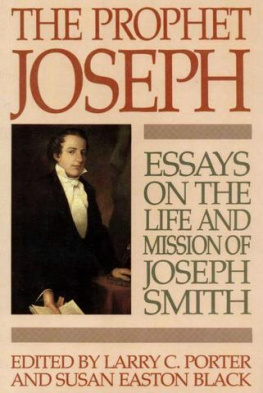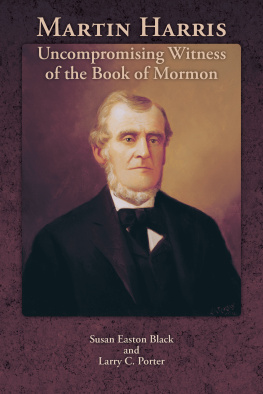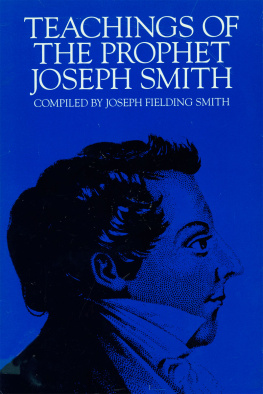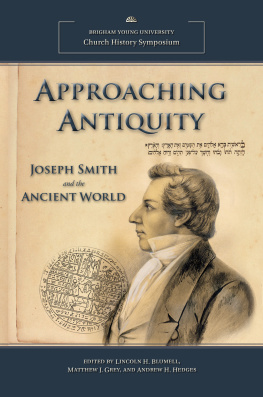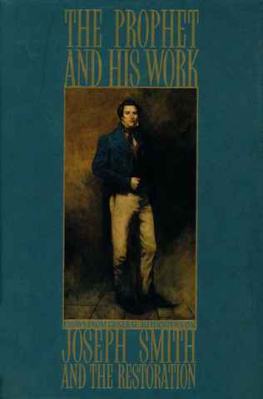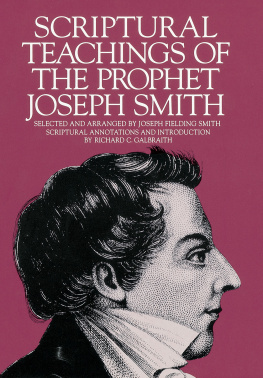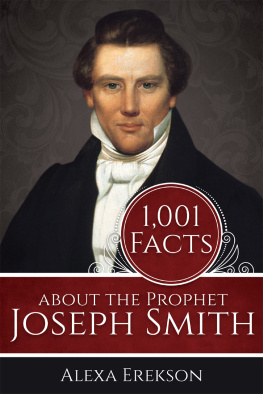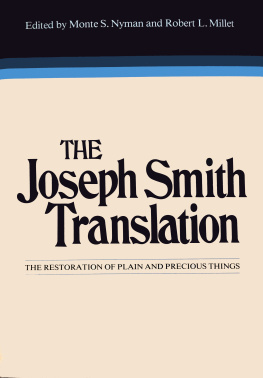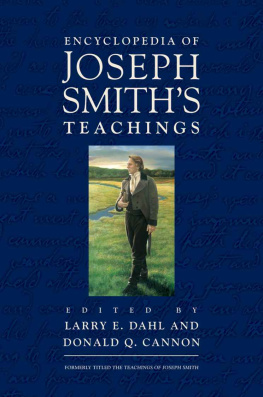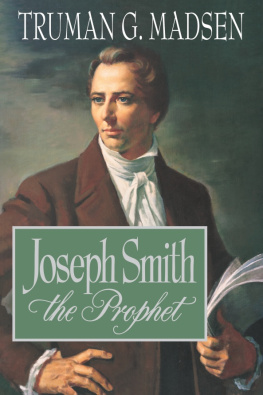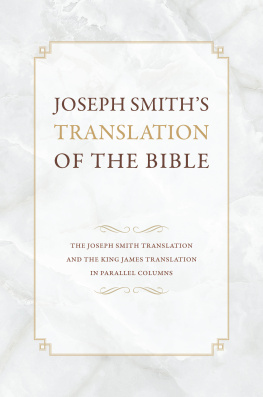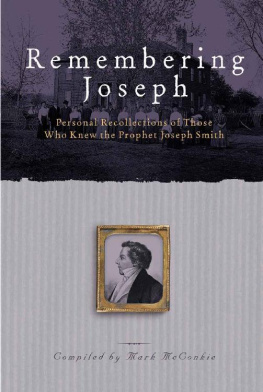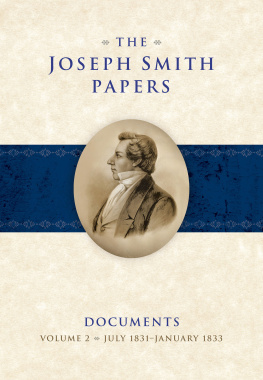Prophet Joseph: Essays on the Life and Mission of Joseph Smith
Susan Easton Black, Larry C. Porter
1988 Deseret Book CompanyAll rights reserved. No part of this book may be reproduced in any form or by any means without permission in writing from the publisher, Deseret Book Company, P.O. Box 30178, Salt Lake City, Utah 84130. This work is not an official publication of The Church of Jesus Christ of Latter-day Saints. The views expressed herein are the responsibility of the author and do not necessarily represent the position of the Church or of Deseret Book Company.Deseret Book is a registered trademark of Deseret Book Company.
Preface
The miraculous beginnings of The Church of Jesus Christ of Latter-day Saints may surprise an inquirer who is not accustomed to having faith in a living God or listening to the words of a modern prophet. Yet these early beginnings are true. God did speak to the youthful Joseph Smith and while calling him by name said, "This is My Beloved Son. Hear Him!" (Joseph Smith-History 1:17.) Since Joseph's first vision of Deity, Joseph's name has been known "for good and evil." (Joseph Smith-History 1:33.) In this book we sincerely declare that we know Joseph's name for "good."
Joseph Smith was what he proclaimed himself to bea prophet, seer, revelator, and translator for God. Joseph magnified these callings by testifying, prophesying, translating, and obeying the commandments of God. Unfortunately, most of his contemporaries rejected both Joseph and the word of the Lord. With this rejection came Joseph's continual foepersecution. Ridicule, arrest warrants, and evil speaking were his common companions throughout his short life. Doctrines revealed by the Lord to Joseph Smith were distorted by apostates to disprove his claims of divine revelation and to arouse public sentiment against him.
Yet amid the persecution, suffering, and rejection by man, the Lord did not leave Joseph comfortless. While in Liberty Jail, under the sentence of death, the Prophet was promised that he would be delivered and his friends would greet him again with "warm hearts and friendly hands." (D&C 121:9.) This prophecy was fulfilled.
Not until 27 June 1844 was Joseph's life taken. Assassins destroyed his body, but they could not destroy the "broad seal affixed to 'Mormonism'" which repeatedly affirms that Joseph, the religious martyr, sealed his testimony with his blood. (D&C 135:7.)
Volumes of literature have been written about the life, mission, persecution, and teachings of Joseph Smith. Some of these volumes lack detailed scholarship while expounding faith. Others declare their impeccable scholarship, yet deny faith. Most of the texts rewrite known facts as a historical narrative, while ignoring well-documented new discoveries concerning Joseph.
The unique characteristic of this book is that recognized Latter-day Saint scholars testify through their diligent study, expertise, and faith to the singularity of the divine calling of Joseph Smith as a prophet of God. These eminent authors have accurately documented through their meticulous research the life and mission of Joseph and proclaim in their writings their testimony. Through their writings, Joseph is clearly seen as the prophet of the Restoration. We humbly express to these scholars, who are our friends and colleagues, our gratitude for their contribution to this book. We also extend our appreciation to Don E. Norton and Jane Chapman of Brigham Young University for their assistance in the preliminary preparation of the manuscript of this book.
It is our hope that this book of essays on the life and mission of Joseph Smith will be rewarding reading for you. We hope that in your reading you will learn the details of his life and share our conviction that Joseph was what he professed to bea prophet of God.
Chapter 1
Joseph Smith's Family Background
Richard L. Bushman
H. Rodney Sharp Professor of History
University of Delaware
Because the Latter-day Saints love and honor Joseph Smith, we wish to create for him a family background in perfect harmony with his later life as a prophet. Not that his parents had to be wealthy or well-educated, for we know they certainly were not, but we believe they must have been devout people who taught their son faith in the Christian religion and surrounded him with their love. We are inclined to think they lived comfortably, though never opulently, with a large, happy family of brothers and sisters growing up together. We are not altogether in error when we imagine the Smith household this way. They did love and depend heavily on one another. Our mistake is to remove from the picture the stresses and strains the family felt. They labored under a burden of serious poverty during all the years when Joseph was growing up; accumulating the necessities and a few of the simplest amenities was a struggle that engaged the family nearly every day of their lives. As if this were not enough, there were deep disagreements over religion. All the Smiths were believers, but Lucy Smith and Joseph Smith, Sr., differed sharply over where and how to find God. When Joseph, Jr., was a young teenager, the mother and father split so badly that Lucy went off to church with some of the children, and Joseph, Sr., stayed home with the others. We err in trying to bury these real difficulties, because without them the Prophet's religious calling seems like an unbidden elevation, requiring little effort on his part, instead of one that emerged out of struggle and confusion. It may well be that the most important early preparation for his later call came from dealing with stresses within the family. It is certainly true that Joseph's organization of the Church played an important part in bringing the family together. It is equally clear that the achievement of unity within the family on religious questions meant a great deal to Joseph Smith.
Both of Joseph's parents had been brought up in families who suffered from economic disruptions and religious perplexities. There was not a stable, conventional religious tradition in either family on which Lucy Mack Smith or Joseph Smith, Sr., could rely. Lucy's father, Solomon Mack, was indentured to a family in Lyme, Connecticut, when he was just four years old because his own father had lost his land and was unable to support his four children. Solomon complained later that the family of his master had no feeling for the needs of a little boy. "I was treated by my master as his property and not as his fellow mortal." The man gave young Solomon little education and no religious instruction. "His whole attention was taken up on the pursuits of the good things of this world; wealth was his supreme object. I am afraid gold was his God." Late in life, at age seventy-five, Solomon went through a religious conversion and spent his declining years trying to persuade any who would hear of the folly of worldly pursuits, but until that time Solomon himself concentrated his efforts almost entirely on the acquisition of wealth, as he had seen his master do. He was engaged in many enterprises, from opening land in New York and New Hampshire, to running a coastal schooner off New England, manufacturing saltpeter for gunpowder, and serving on a privateer during the Revolution. At one time he was gone from his family for four years while they struggled on alone against a foreclosure on their farm. Solomon knew nothing of their loss until his return, probably because letters never passed between them.
Until his conversion, Solomon had little religion to offer his children. Lucy received instruction from her mother, the daughter of a deacon in the East Haddam, Connecticut, church near Lyme. Solomon gave his wife, Lydia Gates, full credit for teaching the children habits of "piety, gentleness, and reflection." But she reached this reconciliation on her own, with little help from a minister or church. The religious people who visited her brought so little satisfaction that she refused to join one of their churches. She depended on Bible reading and meditation for her worship. Finally she found a minister who agreed to baptize her without requiring that she join his church; and that is where she stood for many years. Lucy inherited from her mother religious yearnings but no church. Her brother Jason at age sixteen considered himself a seeker, one who was looking for the true religion, and Lucy acted the part herself for most of her life. Perhaps in consequence of the incongruous combination of her father's lack of religion and her mother's piety, Lucy deeply wanted religion without knowing where to find it.

